Introduction
The case started as a result of an arrest of Miranda at his home and was taken to police station for interrogation. During the arrest, the defendant was never made aware of the right to remain silent as offered under the Fifth Amendment of the United States. He was also not notified regarding the right to have counsel during questioning. As a result, Miranda made incriminating statements by giving oral and written confession about the kidnapping and rape case against him. Consequently, the oral and written confessions were later relied upon during his trial which found him guilty hence being sentenced 30 years on each count. His appeal was unsuccessful following the Supreme Court ruling that his rights were not violated during interrogation.
Procedural History of the Case
The case was brought into the Arizona trial court regarding an allegation of rape and kidnapping against Miranda. The case revolves around the police questioning of crime suspects which elicit oral admissions and signing of written confessions. Three similar cases had occurred where defendants underwent police questioning without observance of their constitutional rights. These were robbery case against Michael Vignera, burglaries cases against Carl Calvin, and purse snatches cases against Allen Stewart. In Miranda case, the court found him guilty of the crime and was being sentenced. The Supreme Court further ruled that Miranda did not ask for counsel during cross-examination. The four defendants later petitioned the US Supreme Court to review their cases.
Issue
The primary issue in the case regards whether the police, detectives or prosecutors are obligated to inform the defendants about their Fifth Amendment constitutional rights prior to interrogation. The case further brought the issue on whether the incriminating evidence offered by a defendant without legal counsel is admissible against the individual during the trial. The case emphasizes the need to respect defendants'' constitutional rights of remaining silent and having a counsel.
Holding
The Supreme Court held that the government must inform the defendants of their Fifth Amendment constitutional rights before being subjected to police interrogation. The court specifically highlighted the importance of the right to counsel and right to remain silent to the arrestee during an arrest. In absence of these notifications, anything confessed or admitted by the individual whether is inculpatory or exculpatory will not be admissible in any US court. The interrogation process should be limited to specific rights and suspects must be given waivers and warnings before being grilled. Similarly, the court ruled that the statements obtained from Miranda and the other three cases were unconstitutionally obtained hence they reversed their judgment in the courts. They, however, affirmed the judgement of the Stewart case in the Supreme Court of California.
Rationale
The ruling was based on the legal principle offered by the Fifth Amendment of the United States. It was clear that the police never informed Miranda of his constitutional rights before undergoing interrogation. The judgement of the Supreme Court of Arizona was correctly reversed for failing to observe police coercion during the custodial interrogation of the Miranda case. Furthermore, the court considered unfair tactics used by the police to attain confession by Miranda which was unconstitutional. The use of trickery by police of not informing the defendants of their constitutional rights constituted to a violation of the Fifth Amendment thus calling for a reversal of the judgment.
Cite this page
Miranda Case Study . (2022, Dec 02). Retrieved from https://proessays.net/essays/miranda-case-study
If you are the original author of this essay and no longer wish to have it published on the ProEssays website, please click below to request its removal:
- Globalization and Illicit Activities Essay Example
- Advocates for Child Abuse Victims Essay Example
- Improvements to the Correctional System Paper Example
- Personal Liberty, Freedom of Expression and Propaganda Paper Exaample
- Essay Sample on Rogue Lawyer: Cynical Fight for True Justice
- Essay Sample on Women: Breaking Barriers of Discrimination in Society
- Free Essay Sample on Same-Sex Marriage in the US







